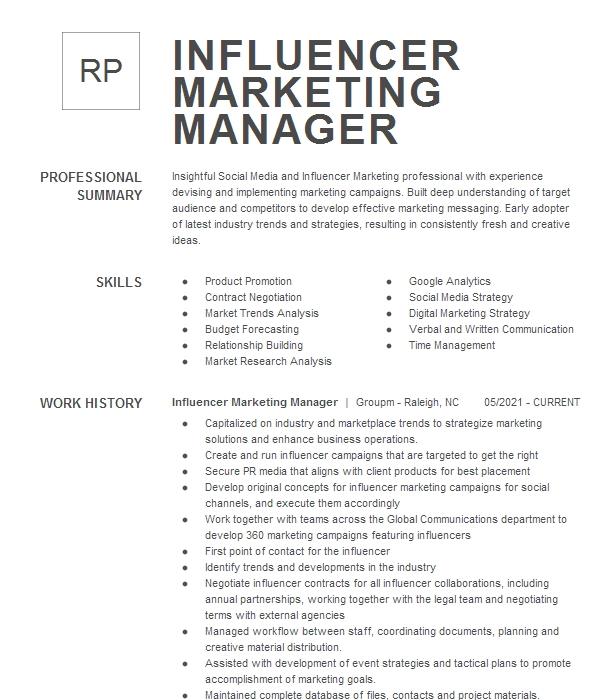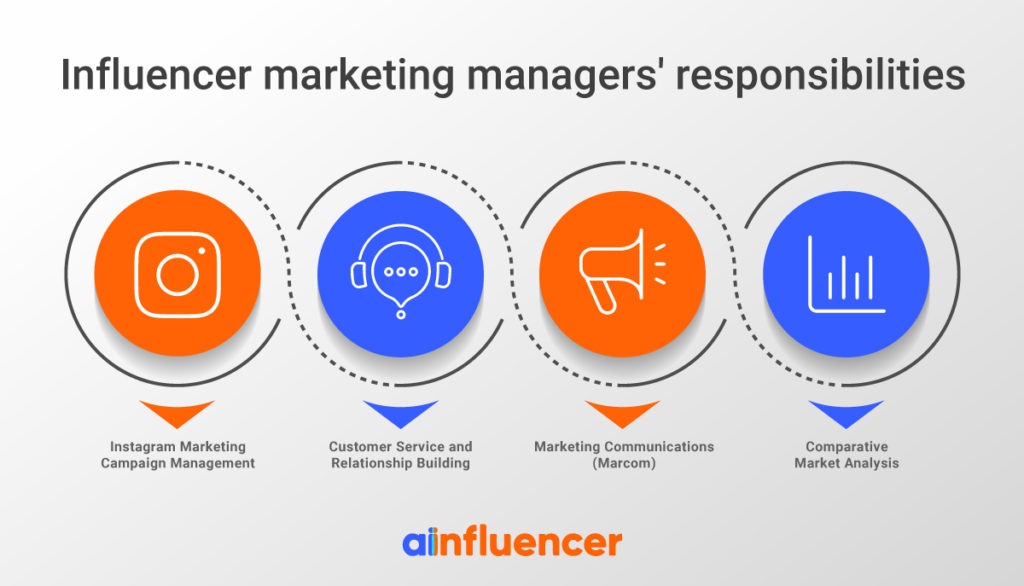An Influencer Marketing Manager develops and implements marketing strategies using influencers. They boost brand visibility and engagement.
An Influencer Marketing Manager plays a crucial role in modern marketing strategies. They identify and collaborate with influencers who align with the brand’s values and target audience. By leveraging these partnerships, they amplify brand messages and drive consumer engagement. This role requires strong relationship-building skills, analytical thinking, and creativity.
They track campaign performance to optimize future efforts and ensure a high return on investment. Effective influencer marketing can significantly enhance brand awareness and loyalty. This dynamic role is essential for brands looking to thrive in the digital age.

Credit: www.livecareer.com
The Rise Of Influencer Marketing
Influencer marketing has become a powerful tool for brands. It connects with audiences in a genuine way. Social media influencers are key players in this shift. They build trust and drive engagement.
Evolving From Celebrity Endorsements
Celebrity endorsements were the trend years ago. Big stars promoted products. People trusted them. Influencer marketing takes this further. Influencers are relatable. Their followers see them as friends.
Influencers share daily lives. They use products they believe in. Their recommendations feel authentic. This authenticity builds trust. Followers are more likely to try products.
Impact On Today’s Consumer Behavior
Today’s consumers value real connections. They want genuine reviews. Influencers provide this. They engage with their audience. They answer questions and give honest opinions.
Brands benefit from this engagement. Influencers can drive sales. They create buzz around products. Their followers trust their opinions. This trust translates into action.
| Celebrity Endorsements | Influencer Marketing |
|---|---|
| High cost | Cost-effective |
| Less relatable | Highly relatable |
| One-way communication | Interactive engagement |
- Influencers build trust with their audience.
- They offer genuine reviews.
- They engage directly with followers.
Role Of An Influencer Marketing Manager
An Influencer Marketing Manager connects brands with influencers. They manage campaigns and ensure successful collaborations. Their role requires creativity, strategy, and communication.
Key Responsibilities
An Influencer Marketing Manager has many tasks. They include:
- Identifying the right influencers.
- Negotiating contracts.
- Managing campaigns from start to finish.
- Tracking the performance of campaigns.
- Maintaining relationships with influencers.
| Task | Description |
|---|---|
| Identifying Influencers | Finding influencers who align with the brand. |
| Negotiating Contracts | Agreeing on terms and conditions with influencers. |
| Managing Campaigns | Overseeing campaigns from start to end. |
| Tracking Performance | Measuring the success of campaigns. |
| Maintaining Relationships | Keeping a good rapport with influencers. |
Necessary Skills And Qualifications
To succeed, an Influencer Marketing Manager needs specific skills and qualifications:
- Communication Skills: Must communicate clearly and effectively.
- Negotiation Skills: Must negotiate fair terms with influencers.
- Analytical Skills: Must analyze campaign performance.
- Creativity: Must think of unique campaign ideas.
- Experience: Marketing or PR experience is crucial.
These skills and qualifications help in managing successful influencer campaigns.
Crafting An Influencer Marketing Strategy
Creating a successful influencer marketing strategy is crucial. It helps you connect with your target audience. A well-defined strategy ensures you achieve your marketing goals efficiently. Here are the steps to craft an effective influencer marketing strategy.
Setting Clear Objectives
Start by setting clear objectives. Define what you want to achieve with your influencer marketing campaign. Here are some common goals:
- Increase brand awareness
- Drive website traffic
- Boost sales and conversions
- Enhance social media engagement
Ensure your objectives are specific, measurable, attainable, relevant, and time-bound (SMART). Clear objectives guide your entire strategy.
Identifying The Right Influencers
Finding the right influencers is key. Identify influencers who align with your brand values and target audience. Consider the following factors:
| Factor | Details |
|---|---|
| Audience Demographics | Age, gender, location, interests |
| Engagement Rate | Likes, comments, shares |
| Content Quality | Visual appeal, consistency, originality |
| Platform | Instagram, YouTube, TikTok, etc. |
Use tools like BuzzSumo or Influence.co to find potential influencers. Evaluate their profiles thoroughly before making a decision.
Creating A Content Roadmap
A content roadmap is essential. It outlines the type of content and timeline for your campaign. Follow these steps:
- Define content themes
- Decide on content formats (videos, blogs, posts)
- Create a content calendar
- Coordinate with influencers for content creation
- Schedule and publish content
Ensure the content is engaging, authentic, and aligned with your brand message. Monitor the performance and make adjustments as needed.
Collaboration For Success
Effective collaboration is crucial for influencer marketing success. It involves strategic partnerships that benefit both brands and influencers. This section will cover two key aspects: negotiating with influencers and building long-term relationships.
Negotiating With Influencers
Negotiation is an art. It requires a clear understanding of your objectives and the influencer’s value. Here are some tips:
- Know Your Budget: Set a clear budget beforehand.
- Understand Influencer Value: Evaluate their reach and engagement.
- Be Transparent: Clearly outline your campaign goals.
- Offer Flexibility: Allow room for creative input from the influencer.
Table below highlights key points:
| Aspect | Details |
|---|---|
| Budget | Set a clear and realistic budget. |
| Value | Evaluate influencer’s reach and engagement. |
| Transparency | Clearly outline campaign goals. |
| Flexibility | Allow room for creative input. |
Building Long-term Relationships
Long-term relationships with influencers can yield better results. Here’s how to build them:
- Consistent Communication: Keep in regular touch.
- Mutual Respect: Value their input and creativity.
- Offer Perks: Provide exclusive offers or perks.
- Collaborate Often: Engage in multiple campaigns together.
Strong relationships lead to trust and better collaboration. Consider these tips for ongoing success:
- Regular check-ins
- Feedback loops
- Joint brainstorming sessions
Measuring The Impact
Measuring the Impact of influencer marketing is crucial for any brand. You need to know if your strategy is working. By understanding key metrics, you can refine your approach. This ensures higher returns on investment (ROI).
Key Performance Indicators
Tracking the right Key Performance Indicators (KPIs) is essential. These metrics help you understand the performance of your campaigns. Common KPIs include:
- Engagement Rate: Measures how much users interact with your content.
- Reach: The number of unique users who see your content.
- Conversions: Tracks how many users take a desired action.
- Return on Investment (ROI): Compares the cost of the campaign to its revenue.
Analyzing Campaign Success
To understand a campaign’s success, use both quantitative and qualitative data. Quantitative data includes metrics like reach and engagement. Qualitative data involves user feedback and brand sentiment.
| Metric | Type | Importance |
|---|---|---|
| Engagement Rate | Quantitative | High |
| Reach | Quantitative | Medium |
| Conversions | Quantitative | High |
| User Feedback | Qualitative | High |
By analyzing these metrics, you can identify what works and what doesn’t. This allows you to make data-driven decisions for future campaigns.
Navigating Challenges And Setbacks
Every Influencer Marketing Manager faces challenges. Learning to navigate these setbacks is crucial. Effective strategies help in overcoming obstacles and achieving success. Below, we discuss two main challenges: negative publicity and changing algorithms.
Dealing With Negative Publicity
Negative publicity can harm an influencer’s reputation. This can also affect brand partnerships. An Influencer Marketing Manager must act quickly. Addressing issues promptly is essential.
Here are some strategies:
- Monitor social media: Keep an eye on comments and mentions.
- Respond promptly: Address concerns and offer solutions.
- Stay transparent: Share the steps you are taking to resolve issues.
- Engage positively: Encourage positive interactions and feedback.
Implementing these strategies can mitigate the impact of negative publicity. Building a positive relationship with the audience is key.
Adapting To Changing Algorithms
Social media platforms often change their algorithms. This can affect content visibility. An Influencer Marketing Manager must stay updated. Adapting strategies is necessary to maintain reach.
Consider these tips:
- Stay informed: Follow platform updates and news.
- Experiment with content: Test different formats and styles.
- Analyze performance: Use analytics tools to track results.
- Engage consistently: Maintain regular interaction with the audience.
These actions help to adapt to changes effectively. Consistent engagement can improve algorithm performance.
Future Trends In Influencer Marketing
Influencer marketing is evolving fast. New trends shape the future of this industry. Brands must stay updated to stay ahead. Let’s explore the key future trends.
Leveraging Micro-influencers
Micro-influencers have a small but loyal audience. They often have between 1,000 to 100,000 followers. Their followers trust them deeply. This trust can lead to higher engagement rates.
Brands find micro-influencers cost-effective. They charge less than mega influencers. This makes them a good choice for small businesses. Micro-influencers also create authentic content. Their posts often feel more genuine to their followers.
| Influencer Type | Followers | Engagement Rate |
|---|---|---|
| Micro-Influencers | 1,000 – 100,000 | Higher |
| Mega Influencers | 1 million+ | Lower |
Incorporating Emerging Technologies
Emerging technologies are changing influencer marketing. Artificial Intelligence (AI) is one such technology. AI helps in finding the right influencers. It analyzes data to match brands with influencers.
Virtual Reality (VR) is also gaining popularity. VR creates immersive experiences for audiences. Influencers can use VR to showcase products in new ways. This can lead to higher engagement.
Blockchain technology ensures transparency. It tracks transactions between brands and influencers. This builds trust in influencer marketing.
- AI for finding influencers
- VR for immersive experiences
- Blockchain for transparency

Credit: yoloco.io

Credit: blog.ainfluencer.com
Frequently Asked Questions
What Is An Influencer Marketing Manager?
An influencer marketing manager oversees collaborations between brands and influencers. They manage campaigns, negotiate deals, and track performance. Their goal is to boost brand visibility and engagement through influencer partnerships.
How Much Do Influencer Marketing Managers Make?
Influencer marketing managers typically earn between $50,000 and $100,000 annually. Factors like experience, location, and company size impact salaries.
How Do Influencer Managers Get Paid?
Influencer managers get paid through commissions, typically 10-20% of the influencer’s earnings. They may also charge flat fees.
What Does Influencer Marketing Do?
Influencer marketing leverages individuals with large followings to promote products or services. It builds brand awareness and drives sales. Influencers create authentic content to engage their audience. This strategy increases trust and credibility for brands.
What Is An Influencer Marketing Manager?
An Influencer Marketing Manager oversees collaborations between brands and influencers to promote products or services.
Why Hire An Influencer Marketing Manager?
They streamline influencer campaigns, ensure effective partnerships, and maximize ROI for your marketing efforts.
What Skills Do Influencer Marketing Managers Need?
They need skills in communication, negotiation, analytics, social media, and project management.
How Do Influencer Marketing Managers Find Influencers?
They use tools, databases, and social media platforms to identify relevant influencers for campaigns.
What Is The Role Of An Influencer Marketing Manager?
Their role involves planning, executing, and monitoring influencer marketing strategies to achieve business goals.
How Much Do Influencer Marketing Managers Earn?
Salaries vary, but they typically earn between $50,000 and $90,000 annually, depending on experience and location.
Conclusion
An Influencer Marketing Manager can revolutionize your brand’s online presence. Investing in one offers substantial ROI. Their expertise bridges the gap between influencers and target audiences. Embrace this role to enhance your marketing strategy. Stay ahead in the competitive digital landscape by leveraging their skills and connections.
Your brand’s growth awaits.
